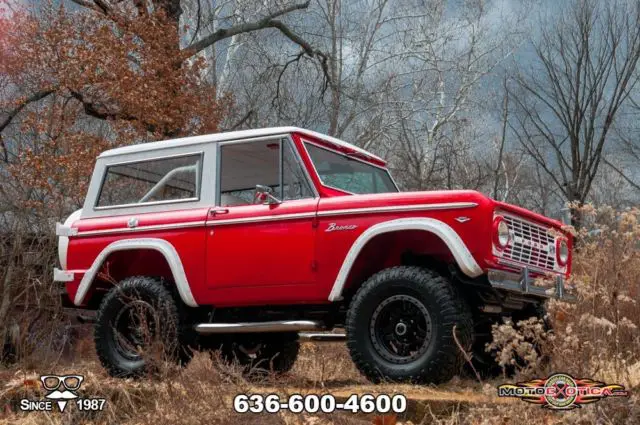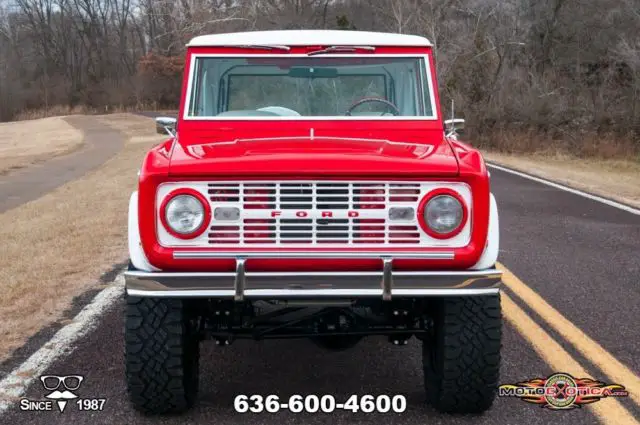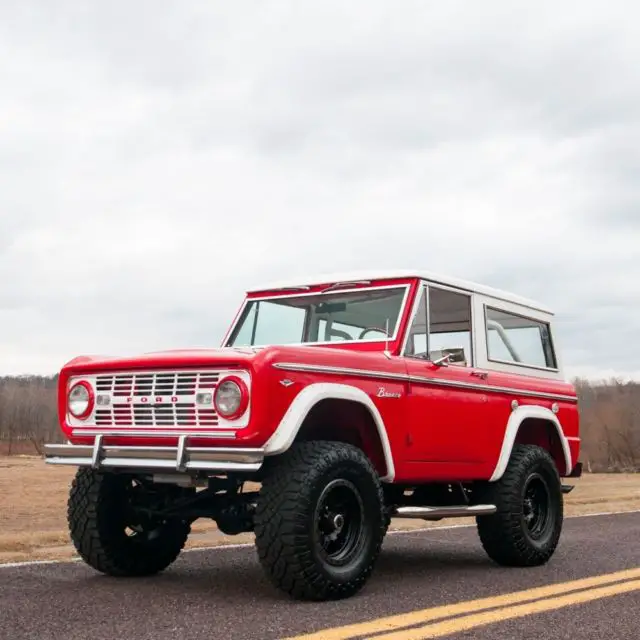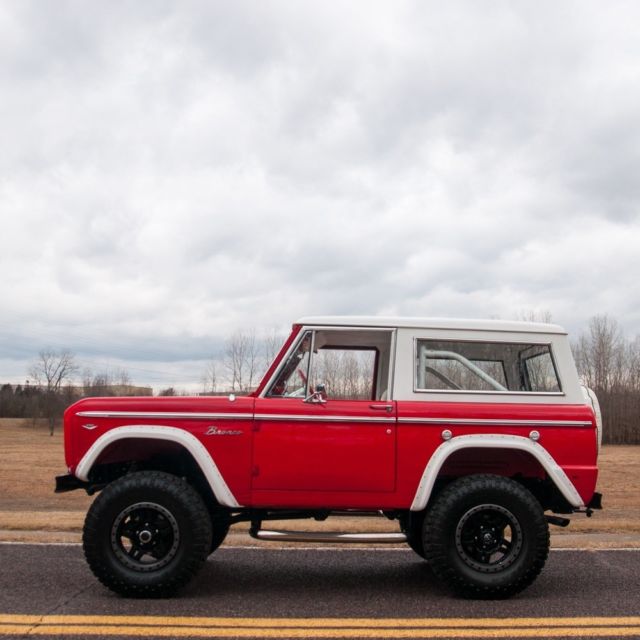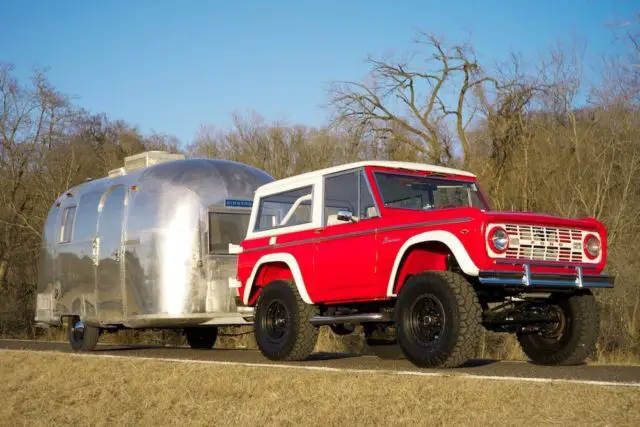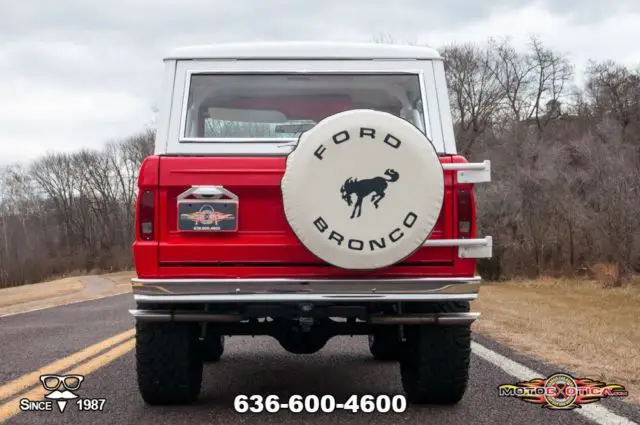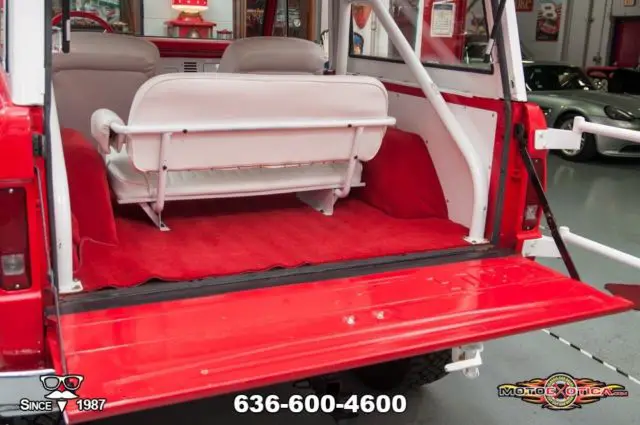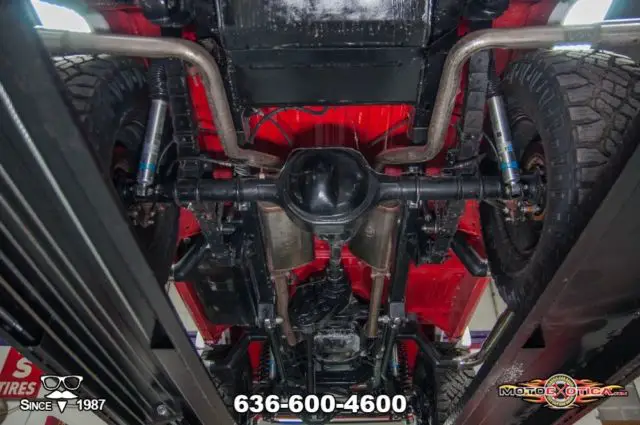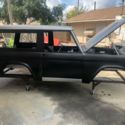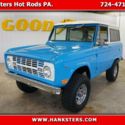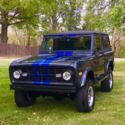1968 Ford Bronco 4x4 Wagon
| Make: | Ford |
| Model: | Bronco |
| SubModel: | Bronco 4x4 Wagon |
| Type: | SUV |
| Trim: | 4x4 Wagon |
| Year: | 1968 |
| Mileage: | 100 |
| VIN: | U15NLD54261 |
| Color: | Red |
| Engine: | 302 V8 |
| Cylinders: | 8 |
| Fuel: | Gasoline |
| Transmission: | Automatic |
| Drive type: | 4WD |
| Interior color: | White |
| Vehicle Title: | Clear |
| Item location: | Saint Louis, Missouri, United States |
1968 Ford Bronco 4x4 Wagon Additional Info:
1968 Ford Bronco 4×4 Wagon Description1968 Ford Bronco 4×4 Wagon
Fresh, frame-off restoration Four-inch lift kit, black Fuel five-spoke off-road wheels, Mile Marker locking front hubs and 33” Goodyear Wrangler Duratrac tires Red exterior with white trim and white interior with red trim 302 CID V-8 engine with four-barrel carburetor, aluminum cylinder heads, stainless steel headers and exhaust Automatic transmission with overdrive, power steering, four-wheel disc brakesSeeking to mark its own territory against competing models from American Motors’ Jeep and International-Harvester’s Scout, Ford unveiled its own off-road entry, the Bronco. MotoeXotica Classic Cars is proud to present this 1968 Bronco 4×4 (VIN code U15) Wagon. Assembled in Ford’s Wayne, Michigan (VIN code L) factory in July 1968 (VIN code D54261), this example is fresh from a frame-off restoration.
Dressed in a glossy red finish with contrasting white trim, this truck looks gorgeous! The windows are clear and crack-free though there is a minor blemish on the right rear glass. The truck’s lights are haze-free and look great while the bodywork is straight and solid, as expected after a recent restoration. The truck’s engine bay is quite tidy, the battery appears new and the bumpers are in overall great condition.
The truck rolls on Goodyear Wrangler Duratrac off-road tires, size LT315/70R17 at all four corners. Each tire surrounds a black, Fuel five-spoke, off-road wheel and in front there are Mile Marker locking front hubs. The wheels and tires are in excellent condition this Bronc has four-wheel disc brakes without power assist.
This Bronco left the factory with a 289 CID V-8, as indicated by the front fender badges but during the restoration, its understood it was swapped for a 302 CID V-8 with a four-barrel carburetor, aluminum cylinder heads, stainless steel headers and exhaust. The motor is mated to an automatic transmission with overdrive. Driver convenience features include power steering.
Inside, the color scheme is reversed – predominantly white with red trim. The front buckets and small rear bench look great, while the contrasting red carpet is in good overall order. The horn is inoperable but the headliner and three-spoke aftermarket steering wheel are in very nice condition while the center console looks good. There is a full-size spare tire in the cargo area. The mirror glass is in decent shape while the column-mounted gear selector looks great. This is a radio delete model.
Side marker lights on front fenders and reflectors on the rear fenders were new for 1968. Armrests, window cranks and door handles were altered as well. A heater and defroster came standard, along with mono-beam front suspension and folding windshield.
The original Bronco was an off-road vehicle (ORV) intended to compete primarily with Jeep CJ models and the International Harvester Scout. The Bronco’s small size, riding on a 92-inch wheelbase, made it maneuverable. The 1966 Bronco was not only Ford’s first compact SUV — its marketing also shows a very early example of promoting a civilian off-roader as a “Sports Utility” (the two-door pickup version).
Ford product manager Donald N. Frey, who conceived the Bronco, also thought of the Ford Mustang; Chairman Lee Iacocca pushed the idea through to production. In many ways, the Bronco was a more original concept than the Mustang; whereas the former was based upon the Ford Falcon, the Bronco had a frame, suspension and body not shared with any other vehicle.
Engineer Paul G. Axelrad designed the Bronco. Axles and brakes came from the Ford F100 four-wheel drive pickup truck but radius arms located the front axle (from the frame near the rear of the transmission forward to the axle). A lateral track bar allowed the use of coil springs that gave the Bronco a 34-foot turning circle, long wheel travel and an anti-dive geometry, useful for snowplowing. The rear suspension was more conventional, with leaf springs in a typical Hotchkiss design. A shift-on the-fly Dana transfer case and locking hubs were standard and heavy-duty suspension was an option.
The initial engine was the Ford 170 CID inline six-cylinder, modified with solid valve lifters, a six quart oil pan, heavy-duty fuel pump, oil-bath air cleaner and a carburetor with a float bowl compensated against tilting.
Styling was subordinated to simplicity and economy, so all glass was flat, bumpers were straight C-sections, the frame was a simple box-section ladder and the basic left and right door skins were identical except for mounting holes.
Early Broncos were offered in wagon, pickup and a less popular roadster configuration. The roadster version was dropped and the sport package, which later became a model line, was added.
The Bronco came with a long option list that included front bucket seats, a rear bench seat, tachometer, CB radio, as well as functional items such as a tow bar, an auxiliary gas tank, a power take-off, a snowplow, a winch and a posthole digger. Aftermarket accessories included campers, overdrive units and the usual array of wheels, tires, chassis, and engine parts for increased performance.
Competition to this Bronco in 1968 included Jeep’s CJ-5 and International-Harvester’s Scout 800.
This truck is currently located at our facility in St. Louis, Missouri. Current mileage on the odometer shows 100 miles since restoration. It is sold as is, where is, on a clean and clear, mileage exempt title. GET OUT AND DRIVE!!!
PLEASE CLICK HERE TO VIEW OUR YOUTUBE VIDEO
VIN: U15NLD54261
Note: Please see full terms and conditions listed below that pertain to the purchase of any said vehicle, thank you.
